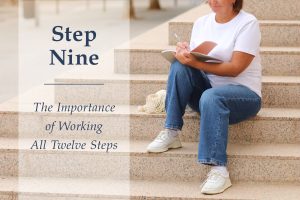I dreaded the Ninth Step more than any of the others, even the Fourth and Fifth Steps. I’ve always envied those who seem to lead fairly normal lives, doing no more than a minimal amount of damage as they went along. I’m not one of those. My selfishness and self-centeredness knew no limits. Everywhere I went, everything I participated in, all that I touched was adversely affected by my behavior. Some of it I could blame on my disease and some of it I couldn’t. I have family who have refused to talk to me for many years. I’ve owed thousands of dollars for failing to make payments, theft, and embezzlement. My anger has lashed out at everyone I know. I’ve lied, cheated, manipulated, and bullied my way with nothing in mind but my own gain. For the times when I acted as a decent person, it was done for how it reflected on me, not for what it offered to others.
I used my sponsor before each and every amends. He looked at each action I was to take and made sure it held no potential for further injury. When direct amends weren’t available, he helped me find alternatives.
One of the greatest benefits, though, of having my list of harms to make amends for was that it allowed me to see that the list, though long, was finite. In my mind, there had been no end at all. It wasn’t until I held something concrete in my hands that I could acknowledge this Ninth Step was possible for me to do.
It wasn’t always easy, but I used my sponsor before each and every amends. When I wrote letters to my parents, he read them first and helped me see where pieces of blame had crept in. He looked at each action I was to take and made sure it held no potential for further injury. He also helped to keep me from making foolish amends where none were owed. He helped me work out payment plans with creditors and friends I’d taken money from. When direct amends weren’t available, he helped me find alternatives.
Some of it didn’t go as I had hoped. My parents didn’t acknowledge my amends and continue to pretend that I don’t exist, even though I made the amends without blaming them for the cruel and abusive treatment I’ve received at their hands. My sponsor helped me see how their lack of acceptance has more to do with their own guilt and shame than with not accepting me as family. I did my best to clean my side, and I’m okay with it now.
Of all my amends, the ones I’ve disliked the most have been financial. I’ve never had much money or the kinds of jobs that pay well. It has been so difficult to send a portion of my meager earnings to someone else. Some days, I’ve been willing to do this, and other days, I’m not so willing. It will take many years—maybe a lifetime—for me to make all my financial restitutions. When I learned a company I’d stolen thousands from was no longer in business, my sponsor helped me pay the money to charities instead.
Where simple apologies were in order, I made them. Of all, these were probably the most gratifying because I had spent my life hiding from these people. Now, I could walk down the street and not fear running into them unexpectedly. Having that sense of isolation removed was my first reward for working this Step.
I no longer try to shut the door on my past. I’m open about my life to anyone who can benefit from my experiences, no matter how horrible. I make decisions now by taking more than just my own interests in mind. And last, but certainly not least, I am able to stay abstinent from compulsive overeating, one day at a time!
The only promise that has not come true for me so far is the removal of my fear of economic insecurity. But that is understandable: the Big Book says, “before we are half way through” (Alcoholics Anonymous, 4th ed., p. 83), and I still have quite a way to go before I get close to the halfway mark for financial restitution. But I have no doubt . . . this promise will come true for me too!
— Edited and reprinted from Intergroup Scoop, Oregon Intergroup, September 2001





